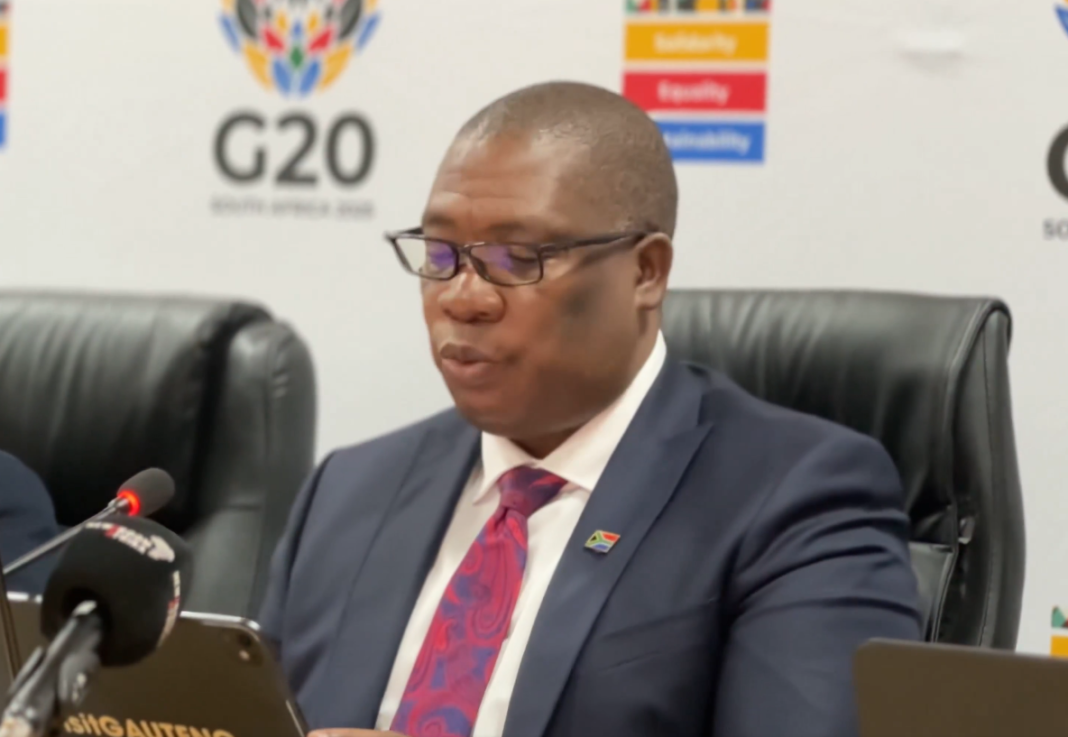By Akani Nkuna
Gauteng Premier Panyaza Lesufi said on Tuesday that the province had raked in up to R3 billion in investment and visitor spending over the G20 Leaders’ Summit weekend in Johannesburg.
Lesufi was addressing the media at the Gauteng Provincial Legislature, where he provided a report on the province’s security operations and the investment prospects that resulted from the summit.
“We can confirm that this was a resounding support for our province. Preliminary reports indicate that,[for] that weekend alone, Gauteng scored investment amounts between R1 billion and R3 billion. We are still consolidating these figures from the hotels, travel agencies, and institutions that shared their statistics with ours,” he said.
“But we can confirm almost all our hotels were fully booked, the airlines to our province were also booked, and our malls were busy with visitors, including our tourists’ destinations in Soweto, Magalies, and Sandton in particular, where the majority of our visitors enjoyed themselves.”
The summit, the first of its kind on African soil, showcased the country’s potential on the global stage. Lesufi said that it would boost South Africa’s future investment prospects, and that a huge demand to invest had already emerged.
He said the exposure the summit afforded the City of Johannesburg in particular, and the province as a whole, was key to supporting Gauteng’s sustainable and long-term development plans.
“The summit did not just bring a large influx of visitors, it also created a huge demand of future investment. We entered into long debates and discussions between local businesses as well as future investors,” Lesufi said.
The premier said one of the key lessons from the summit was the importance of cultural exchange and diversifying languages of instruction beyond English, in order to accommodate some of the world’s major languages.
He called for major investment to better equip the city to cater for international tourists who were not familiar with English, including ensuring that road signs also carried other international languages, which he said would boost the tourism sector beyond the G20.
“Our interpretation capabilities were overstretched and in some instances non-existent. I do not think that we managed to put the language interpretation tools available to those that do not speak English,” Lesufi said.
He said that the heightened visibility of law enforcement officials during the summit came at a “huge cost” to the province, as some officers worked overtime to provide the capacity needed to neutralise security threats.
He said, however, that the exact amount would be provided at a later date, once all calculations had been completed.
The police arrested 1 799 people from 17 November to 20 November for crimes including theft, kidnapping and vandalising infrastructure, while 1 075 cases related to crimes such as rape, assault, murder and house robberies.
Lesufi also attributed some actions that appeared aimed at destabilising the summit – including planned protests around Nasrec, where the summit was held, and power blackouts in the days leading up to the meeting — to sabotage.
“During this period it was quite clear that there was a team that was hell-bent on destroying and vandalising some of the state installations, with an intention of projecting a picture of a failed state. Even though the majority of these people were arrested, it is quite clear,” he said.
Gauteng Police say there were 14 reported cases linked to the G20 Summit with 13 arrests.
Lesufi said one of the reported incidents was two Brazilian pilots who had a dispute with women they met at an “entertainment” venue over transaction fees.
The recent G20 Leaders’ Summit has been hailed as a resounding success, with government officials praising the seamless coordination between national, provincial, and local agencies.
Authorities credited agile governance and integrated planning for the smooth execution of the event, which showcased refurbished infrastructure and accelerated service delivery across key urban zones.
Residents of Gauteng were commended for their resilience and cooperation during the summit’s high-security operations, which included road closures and visible policing.
Security forces maintained a robust presence throughout the summit, deploying advanced surveillance technologies such as drones, CCTV networks, and facial recognition systems.
According to SAPS, 17 suspects were arrested for various crimes, including possession of unlicensed firearms, drugs, theft, assault, and robbery. These arrests were concentrated in areas like 17th Avenue in Alexandra and were facilitated by intelligence-led operations and collaboration with Metro Police and private security firms.
Public awareness campaigns and community engagement efforts played a vital role in ensuring cooperation and minimizing disruption. As the country reflects on the outcomes of the summit, the emphasis now shifts to sustaining the momentum of service delivery and leveraging the global spotlight to drive long-term development.
INSIDE METROS

